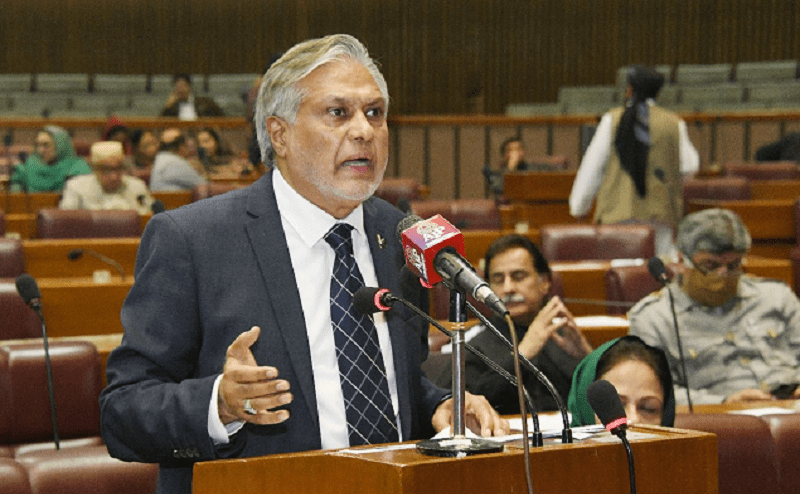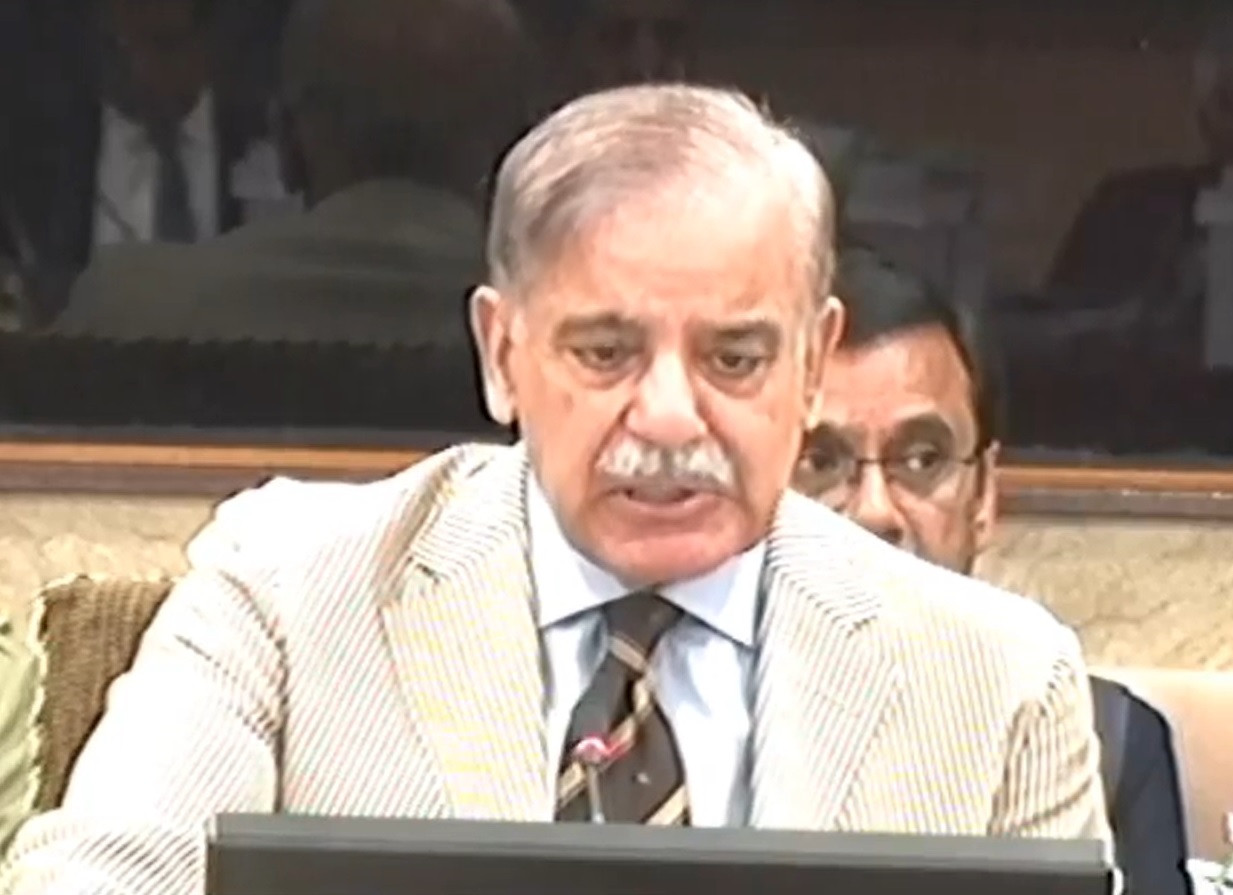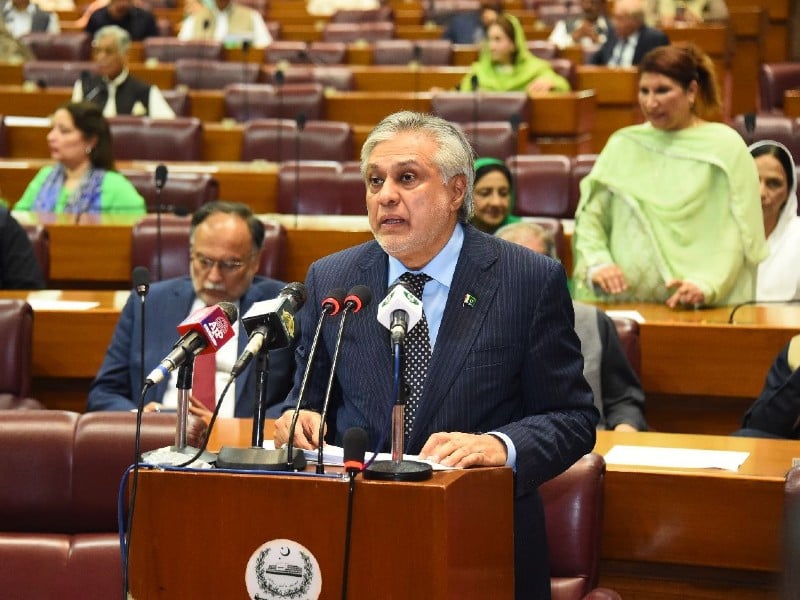ghazi52
PDF THINK TANK: ANALYST

- Joined
- Mar 21, 2007
- Messages
- 104,005
- Reaction score
- 106
- Country
- Location
.,.
Reuters
June 9, 2023
The government is set to present its annual budget to Parliament shortly, aiming to meet the requirements of the International Monetary Fund (IMF) in order to potentially secure the release of additional bailout funds.
The risk of default on sovereign debt is rising, with the economy creaking under twin deficits and record high inflation, which has further dented the popularity of Prime Minister Shehbaz Sharif’s coalition.
Finance Minister Ishaq Dar is set to deliver his budget speech to Parliament after 4pm.
Some budget figures were announced earlier this week, including development spending of Rs1.15 trillion ($4bn), and an economic growth target of 3.5 per cent for the coming fiscal year.
Sources have also told Reuters that preliminary budget proposals envisaged a fiscal deficit of 7.7pc of GDP, with total spending at Rs14.5 trillion ($50.7bn) and revenue collection at Rs9.2 trillion ($32.2bn).
The proposals also set an inflation target of 21pc, well below the record high of nearly 38pc inflation recorded in May.
On Thursday, the IMF said that it has been discussing the budget with the government.
The coalition government is hoping to persuade the IMF to unlock at least some of the $2.5bn left in a $6.5bn programme that Pakistan entered in 2019 and which expires at the end of this month.
“The focus of discussions over the FY24 budget is to balance the need to strengthen debt sustainability prospects while creating space to increase social spending,” Esther Perez Ruiz, the IMF’s resident representative for Pakistan, said on Thursday.
The country missed almost all of its economic targets set in the last budget, most notably its growth target, which was initially set at 5pc, revised down to 2pc earlier this year. Growth is now projected to be just 0.29pc for the fiscal year ending June 30.
Foreign exchange reserves have dipped below $4bn, according to data released by the State Bank of Pakistan (SBP) on Thursday, enough to cover barely a month of imports.
The government has no fiscal space to introduce popular measures that will win it votes or a stimulus to spur flagging economic activity, with limited avenues for raising revenue in the short term and domestic and international debt obligations continuing to mount.
A second reason is the lack of fiscal space in the budget given that there is a fiscal deficit target that the government must meet to fulfil the conditions set by the IMF.
The main method that it can deploy to buffer the impact of inflation for those who can least afford it is by enhancing the level of support it gives through the Benazir Income Support Programme (BISP). That is also the right way to target assistance, he said.
“I believe there will be a significant increase in the amount set aside for BISP in the forthcoming budget,” he said. In the longer term, the way to deal with inflation in food items is to ensure adequate supplies through improved productivity, safe storage and transportation and by preventing hoarding.
Energy tariffs for domestic consumers are already subsidised by commercial and industrial users. Cross-subsidy makes industry less competitive, he said.
The IMF’s solution to raise tariffs to stem the circular debt is flawed as it does not address the root causes, which are transmission and distribution losses, theft and non-recovery. Provinces have no incentive to come down hard on people who steal or fail to pay their dues, Malik said.
Topline Securities CEO Mohammad Sohail said no major relief for consumers is likely in the budget as the government has very limited fiscal space.
With the global commodity prices dropping, and due to a high base effect, inflation may come down from a record high of 38pc in May, he added.
About the government’s efforts to ensure price stability in the commodity sector amid an uncertain rupee-dollar parity, he said the government can stabilise the rupee and help control inflationary pressure only if it is able to get funding from the IMF.
Karachi Wholesalers Grocers Association (KWGA) Chairman Rauf Ibrahim said he doesn’t expect the budget to be consumer friendly as the government is under pressure from the IMF to raise taxes. “The government will certainly succumb to IMF pressure,” he said.
Instead of giving huge subsidies to the utility stores, the government should consider introducing a rationing system for consumers. In addition, it should make solar power mandatory in all new housing projects, he added.

Watched by IMF, govt to present budget for new fiscal year shortly
Finance Minister Ishaq Dar is set to deliver his budget speech to Parliament after 4pm.Reuters
June 9, 2023
The government is set to present its annual budget to Parliament shortly, aiming to meet the requirements of the International Monetary Fund (IMF) in order to potentially secure the release of additional bailout funds.
The risk of default on sovereign debt is rising, with the economy creaking under twin deficits and record high inflation, which has further dented the popularity of Prime Minister Shehbaz Sharif’s coalition.
Finance Minister Ishaq Dar is set to deliver his budget speech to Parliament after 4pm.
Some budget figures were announced earlier this week, including development spending of Rs1.15 trillion ($4bn), and an economic growth target of 3.5 per cent for the coming fiscal year.
Sources have also told Reuters that preliminary budget proposals envisaged a fiscal deficit of 7.7pc of GDP, with total spending at Rs14.5 trillion ($50.7bn) and revenue collection at Rs9.2 trillion ($32.2bn).
The proposals also set an inflation target of 21pc, well below the record high of nearly 38pc inflation recorded in May.
On Thursday, the IMF said that it has been discussing the budget with the government.
The coalition government is hoping to persuade the IMF to unlock at least some of the $2.5bn left in a $6.5bn programme that Pakistan entered in 2019 and which expires at the end of this month.
“The focus of discussions over the FY24 budget is to balance the need to strengthen debt sustainability prospects while creating space to increase social spending,” Esther Perez Ruiz, the IMF’s resident representative for Pakistan, said on Thursday.
The country missed almost all of its economic targets set in the last budget, most notably its growth target, which was initially set at 5pc, revised down to 2pc earlier this year. Growth is now projected to be just 0.29pc for the fiscal year ending June 30.
Foreign exchange reserves have dipped below $4bn, according to data released by the State Bank of Pakistan (SBP) on Thursday, enough to cover barely a month of imports.
The government has no fiscal space to introduce popular measures that will win it votes or a stimulus to spur flagging economic activity, with limited avenues for raising revenue in the short term and domestic and international debt obligations continuing to mount.
Stakeholders expect tough budget
Pakistan Business Council (PBC) CEO Ehsan Malik said the government’s ability to lower prices through a reduction in duties and taxes is limited. That’s mainly because the size of taxes and duties is minimal on essential food items, he said.A second reason is the lack of fiscal space in the budget given that there is a fiscal deficit target that the government must meet to fulfil the conditions set by the IMF.
The main method that it can deploy to buffer the impact of inflation for those who can least afford it is by enhancing the level of support it gives through the Benazir Income Support Programme (BISP). That is also the right way to target assistance, he said.
“I believe there will be a significant increase in the amount set aside for BISP in the forthcoming budget,” he said. In the longer term, the way to deal with inflation in food items is to ensure adequate supplies through improved productivity, safe storage and transportation and by preventing hoarding.
Energy tariffs for domestic consumers are already subsidised by commercial and industrial users. Cross-subsidy makes industry less competitive, he said.
The IMF’s solution to raise tariffs to stem the circular debt is flawed as it does not address the root causes, which are transmission and distribution losses, theft and non-recovery. Provinces have no incentive to come down hard on people who steal or fail to pay their dues, Malik said.
Topline Securities CEO Mohammad Sohail said no major relief for consumers is likely in the budget as the government has very limited fiscal space.
With the global commodity prices dropping, and due to a high base effect, inflation may come down from a record high of 38pc in May, he added.
About the government’s efforts to ensure price stability in the commodity sector amid an uncertain rupee-dollar parity, he said the government can stabilise the rupee and help control inflationary pressure only if it is able to get funding from the IMF.
Karachi Wholesalers Grocers Association (KWGA) Chairman Rauf Ibrahim said he doesn’t expect the budget to be consumer friendly as the government is under pressure from the IMF to raise taxes. “The government will certainly succumb to IMF pressure,” he said.
Instead of giving huge subsidies to the utility stores, the government should consider introducing a rationing system for consumers. In addition, it should make solar power mandatory in all new housing projects, he added.

Watched by IMF, govt to present budget for new fiscal year shortly
Finance Minister Ishaq Dar is set to deliver his budget speech to Parliament after 4pm.
www.dawn.com






